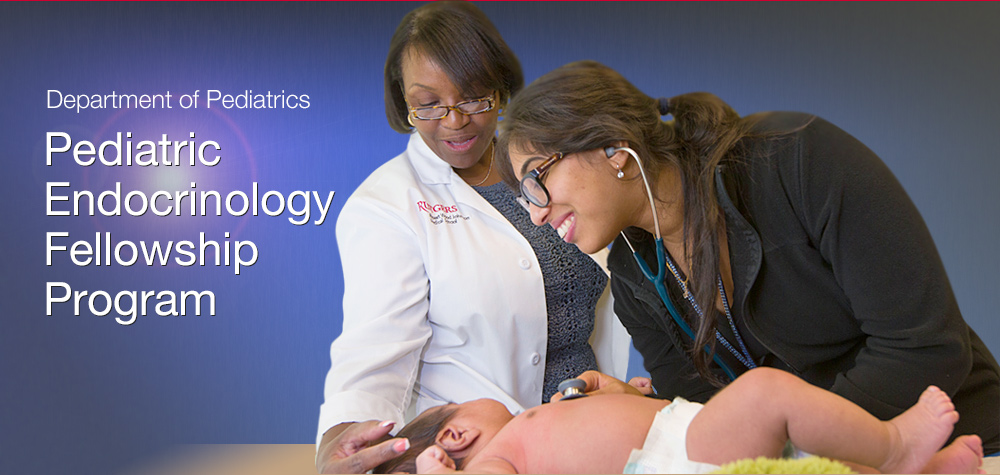-
About RWJMS
- Departments / Institutes
- Alumni
- Make a Gift

Overview
The Pediatric Endocrinology Fellowship Program received accreditation by the Accreditation Council on Graduate Medical Education (ACGME) in 2016. We are the first and only accredited pediatric endocrinology fellowship program in the state of New Jersey.
The ultimate goal of this postgraduate program in to prepare trainees for a career in academic medicine in pediatric endocrinology through a structured curriculum focused on clinical care, teaching, and research skills.
Clinical Training
Clinical training will include the acquisition of broad clinical skills in pediatric endocrinology through exposure to a diverse population of patients ranging in age from newborn to young adult, with both complex and common endocrine problems. The primary clinical goal is to expertly diagnose and manage pediatric endocrine disorders with a comprehensive understanding of the underlying pathophysiology of hormonal regulation from infancy to young adulthood.
Research
In the first year of training, fellows will learn the principles of research (scientific, administrative, ethical, and legal) through a series of research tutorials. Fellows will work with key faculty to identify a research mentor with whom s(he) can design a hypothesis driven research project. With careful guidance from the mentor, fellows will choose members of the scholarship oversight committee (SOC), and will have an SOC meeting at the end of the first year. Protected research time will be provided. Training years 2 and 3 will focus primarily on research but will also include a continued commitment to clinical care including continued participation in the fellows’ weekly continuity clinic. Fellows be actively involved in the day-to-day activities of their translational research project and will learn to conduct experiments and perform data analysis. Fellows will present their research progress regularly at lab meetings and formally to the division and scholarship oversight committee semi-annually. In the final year of training, fellows will prepare a manuscript suitable for publication in a peer-reviewed journal, and submit an abstract(s) to present their findings at a major national meeting such as American Diabetes Association (ADA), Pediatric Endocrine Society (PES), or The Endocrine Society. In addition, fellows will be expected to choose a quality improvement project, coordinate execution of the project with a faculty member, and implement the change within the first two years of training.
Fellowship Goals :
Upon completion of the training program, the graduating fellow will:
- Have developed a comprehensive understanding of basic pediatric endocrine processes, and the mechanisms leading to common and rare disorders
- Demonstrate proficiency in patient evaluations including history-taking and physical examination skills
- Have acquired the knowledge and skills to appropriately select and interpret laboratory and radiologic findings
- Have acquired the knowledge and skills to provide effective management for a variety of common and rare endocrine disorders
- Be able to communicate effectively with patients and their families including disease counseling, as well with other healthcare providers
- Have successfully passed annual in-training examinations
- Have the skills to critically interpret published basic and clinical research
- Have developed a commitment to life-long learning and continued professional growth
After successful completion of the training program, qualified graduates will be eligible for certification by the American Board of Pediatrics Sub-board of Pediatric Endocrinology.